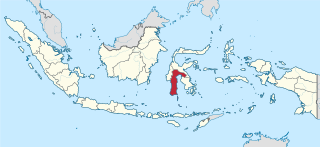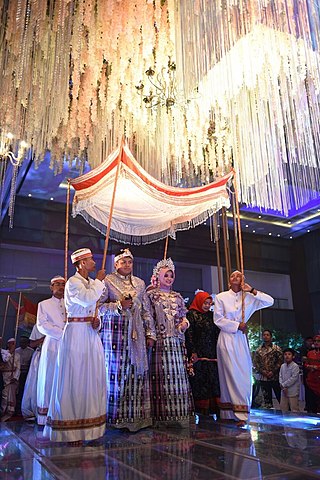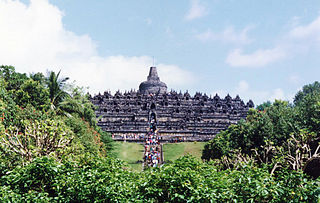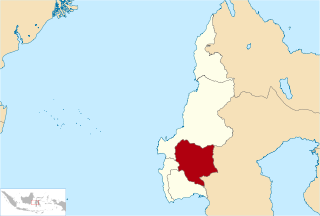
The Dayak or Dyak or Dayuh are one of the native groups of Borneo. It is a loose term for over 200 riverine and hill-dwelling ethnic groups, located principally in the central and southern interior of Borneo, each with its own dialect, customs, laws, territory, and culture, although common distinguishing traits are readily identifiable. Dayak languages are categorised as part of the Austronesian languages. The Dayak were animist in belief; however, since the 19th century there has been mass conversion to Christianity as well as Islam due to the spreading of Abrahamic religions.

South Sulawesi is a province in the southern peninsula of Sulawesi. The Selayar Islands archipelago to the south of Sulawesi is also part of the province. The capital is Makassar. The province is bordered by Central Sulawesi and West Sulawesi to the north, the Gulf of Bone and Southeast Sulawesi to the east, Makassar Strait to the west, and Flores Sea to the south.

North Sulawesi is a province of Indonesia. It is located on the Minahasa Peninsula of the island of Sulawesi, south of the Philippines and southeast of Sabah, Malaysia. It borders the Philippine province of Davao Occidental and Soccsksargen regions of the Philippines to the north, the Maluku Sea to the east, Gorontalo and Celebes Sea to the west and the Gulf of Tomini to the southwest. With the outlying island of Miangas to its north, it is the northernmost province of Indonesia. The province's area is 14,500.28 square kilometres (5,598.59 sq mi), and its population was 2,270,596 according to the 2010 census; this rose to 2,621,923 at the 2020 Census, while the official estimate as at mid 2022 was 2,659,543. North Sulawesi is known as a heaven for divers around the world.

The Bugis people, also known as Buginese, are an ethnicity—the most numerous of the three major linguistic and ethnic groups of South Sulawesi, in the south-western province of Sulawesi, third-largest island of Indonesia. The Bugis in 1605 converted to Islam from Animism. The main religion embraced by the Bugis is Islam, with a small minority adhering to Christianity or a pre-Islamic indigenous belief called Tolotang.

Tana Toraja is a landlocked regency (kabupaten) of South Sulawesi Province of Indonesia, and home to the Toraja ethnic group. It covers an area of 2,054.30 km2 (793.17 sq mi) and had a population of 221,081 at the 2010 census and 280,794 at the 2020 census; the official estimate as at mid 2022 was 291,046. The local government seat is in the town of Makale, while the traditional center of Toraja culture is in Rantepao. Formerly, the Tana Toraja area covered a larger area, but on 24 June 2008 this was divided into two regencies, consisting of Tana Toraja with its capital at Makale and Toraja Utara with its capital at Rantepao.

The Sasak people live mainly on the island of Lombok, Indonesia, numbering around 3.6 million. They are related to the Balinese in language and ancestry, although the Sasak are predominantly Muslim while the Balinese are predominantly Hindu. Sasak people who practice pre-Islamic beliefs are also known as Sasak Boda in reference to the name of the Sasak people's original religion, Bodha.

Kaharingan is an indigenous animistic folk religion of the Katingan, Lawangan, Ma'anyan, Ngaju, and Ot Danum people native to the Central Kalimantan region in Indonesia.

Hinduism in Indonesia, as of the 2018 census, is practised by about 1.74% of the total population, and almost 87% of the population in Bali. Hinduism was the dominant religion in the country before the arrival of Islam and is one of the six official religions of Indonesia today. Hinduism came to Indonesia in the 1st-century through Indian traders, sailors, scholars and priests. A syncretic fusion of pre-existing Javanese folk religion, culture and Hindu ideas, that from the 6th-century also synthesized Buddhist ideas as well, evolved as the Indonesian version of Hinduism. These ideas continued to develop during the Srivijaya and Majapahit empires. About 1400 CE, these kingdoms were introduced to Islam from coast-based Muslim traders, and thereafter Hinduism, which was previously the dominant religion in the region, mostly vanished from many of the islands of Indonesia.

Parepare is a city (kota) in South Sulawesi, Indonesia, located on the southwest coast of Sulawesi, about 155 km (96 mi) north of the provincial capital of Makassar. A port town, it is one of the major population centers of the Bugis people. The city had a population of 129,542 people at the 2010 Census and 151,454 at the 2020 Census; its official estimate as at mid 2022 was 154,854.

Kejawèn or Javanism, also called Kebatinan, Agama Jawa, and Kepercayaan, is a Javanese religious tradition, consisting of an amalgam of animistic, Buddhist, and Hindu aspects. It is rooted in Javanese history and religiosity, syncretizing aspects of different religions.

The history of the Jews in Indonesia began with the arrival of early European explorers and settlers, and the first Jews arrived in the 17th century. Most Indonesian Jews arrived from Southern Europe, the United Kingdom, the Netherlands, Belgium, Germany, France, the Middle East, North Africa, India, China, and Latin America. Jews in Indonesia presently form a very small Jewish community of about 100–550, of mostly Sephardi Jews. Judaism is not recognized as one of the country's six major religions, however its practices are allowed under Perpres 1965 No. 1 and article 29 paragraph 2 of Constitution of Indonesia. Therefore, members of the local Jewish community have to choose to register as "Belief in One Almighty God" or another recognized religions on their official identity cards.

Several different religions are practised in Indonesia. Indonesia is officially a presidential republic and a unitary state without an established state religion. Indonesia has the world's largest Muslim population and the first principle of Indonesia's philosophical foundation, Pancasila, requires its citizens to state the belief in "the one and almighty God". Although, as explained by the Constitutional Court, this first sila of Pancasila is an explicit recognition of divine substances and meant as a principle on how to live together in a religiously diverse society; it isn't an endorsement of a particular theological doctrine on how religions or beliefs should be practised. However, blasphemy is a punishable offence and the Indonesian government has a discriminatory attitude towards its numerous tribal religions, atheist and agnostic citizens. In addition, the Aceh province officially enforces Sharia law and is notorious for its oppressive practices towards religious and sexual minorities. There are also pro-Sharia and fundamentalist movements in several parts of the country with overwhelming Muslim majorities.

Kutai is a historical region in what is now known as East Kalimantan, Indonesia on the island of Borneo and is also the name of the native ethnic group of the region, numbering around 300,000 who have their own language known as the Kutainese language which accompanies their own rich history. Today, the name is preserved in the names of three regencies in East Kalimantan province which are the Kutai Kartanegara Regency, the West Kutai Regency and the East Kutai Regency with the major river flowing in the heart of the region known as the Mahakam River. Kutai is known to be the place of the first and oldest Hindu kingdom to exist in East Indies Archipelago, the Kutai Martadipura Kingdom which was later succeeded by the Muslim Kutai Kartanegara Sultanate.

Mamasa Regency is one of the six regencies that make up the West Sulawesi Province, Indonesia, on the island of Sulawesi. It covers a land area of 3,005.88 km2. The population was 140,082 at the 2010 Census and 163,383 at the 2020 Census; the official estimate as at mid 2022 was 166,471. Its capital is the town of Mamasa. The Mamasa people - which is a sub-group of the Toraja people - form the most common ethnic group.

Sidenreng Rappang Regency is a landlocked regency of South Sulawesi Province in Indonesia. It has an area of 1,883.25 kilometres (1,170.20 mi) and had a population of 271,911 at the 2010 Census and 319,990 at the 2020 Census; the official estimate as at mid 2022 was 327,416. Its capital is at the town of Pangkajene Sidenreng. The original inhabitants of this area are Bugis.

The Butonese people is a collective term that embraces a number of ethnic groups of Buton and neighbouring islands in Southeast Sulawesi. Like many other ethnic groups in Sulawesi, the Butonese are seafarers and traders. Butonese have long since migrated to many parts of the Malay archipelago using smaller vessels ranging from those that can only accommodate five people to large boats that can hold up to about 150 tons of goods. In general, the Butonese are a community that inhabits the region of the historical Buton Sultanate. When the swapraja domain was abolished, so did the Buton Sultanate which ended in 1951. The area of the former Sultanate is now distributed over several regencies and cities of Southeast Sulawesi. Among them are Baubau, Buton Regency, South Buton Regency, Central Buton Regency, North Buton Regency, Wakatobi Regency and Bombana Regency.
Ajatappareng was a historical region in the western part of South Sulawesi consisting of five allied principalities: Sidenreng, Suppa, Rappang, Sawitto, Bacukiki and Alitta. They formed an alliance during the sixteenth century in response to the rise of Gowa and Tallo to the south and rivalling the Telumpoccoe alliance—consisting three Bugis kingdoms of Bone, Wajo, and Soppeng—to the east. The Ajatappareng confederation became a regional power and a major port thanks to its naval power and the exodus of traders fleeing the Portuguese capture of Malacca. The confederation's power declined in the seventeenth century, when it was subjugated by Gowa. The later invasion of South Sulawesi by the Dutch East India Company and its imposition of monopoly ended the region's status as a trade centre.
Persatuan Sepakbola Nene Mallomo is an Indonesian football club based in Sidenreng Rappang Regency, South Sulawesi. They currently compete in the Liga 3.
The Torajan Muslims is a term for Torajan people who follow the Islam religion. Islam itself is a minority religion adhered to by Torajans. In general, the Torajan people adhere to Christianity; majority Protestant. In addition, small Torajan Muslim communities of muallaf are also found in Bontang City, East Kalimantan; a place where many Torajans migrants are found.
















